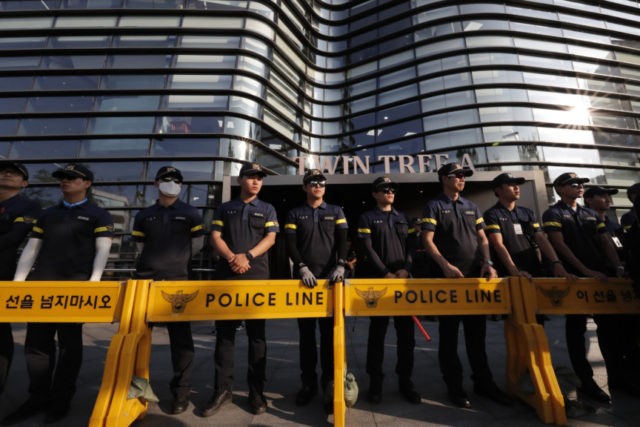After a modestly hopeful week with a few encouraging signs of diplomatic engagement, the rift between South Korea and Japan took another turn for the worse on Thursday with South Korea’s announcement that it will cancel an intelligence-sharing agreement with Japan.
The pact in question, known as the General Security of Military Information Agreement (GSOMIA), was established in 2016 to make it easier for South Korea and Japan to share information about North Korea’s nuclear missile program and Chinese activities in the region.
GSOMIA would have been renewed automatically this Saturday if South Korean President Moon Jae-in had not decided to withdraw after a lengthy consultation with his National Security Council on Thursday. The Moon administration could conceivably change its mind before Saturday and allow the agreement to renew.
The decision was explicitly linked to Japan’s removal of South Korea from its “white list” of most trusted trading partners, a move widely seen as retaliation for the South Korean Supreme Court allowing Japanese businesses to be sued for restitution for using forced labor during the Japanese occupation of Korea during the World War II era.
“Under this situation, we have determined that it would not serve our national interest to maintain an agreement we signed with the aim of exchanging military information which is sensitive to security,” said South Korean NSC Deputy Director Kim You-geun, taking a shot at Japan’s allegations of South Korean companies shipping banned materials to North Korea, the ostensible reason for Japan rescinding South Korea’s trusted trade status.
The Japanese government immediately protested South Korea’s withdrawal from the intel-sharing pact, arguing the trade dispute between the two countries should not lead to a potentially dangerous breakdown of security cooperation.
Japanese Foreign Minister Taro Kono said Seoul’s decision was a “completely mistaken response,” and the South Korean ambassador was summoned to receive a formal protest.
“The relationship between Japan and South Korea is in a very severe situation with the series of extremely negative and irrational moves by South Korea, including the decision this time,” said Kono. “The Japanese government will continue to urge South Korea to respond sensibly, based on our consistent stand over various issues.”
The Pentagon, clearly worried about the regional security ramifications as another attempt at nuclear diplomacy with North Korea is contemplated, urged South Korea and Japan to “work together to resolve their differences.”
The Moon administration responded by stressing that South Korea still intends to “strengthen cooperation with the United States and develop the alliance.”
The U.S. facilitated information-sharing between South Korea and Japan before GSOMIA was signed in 2016 and could resume that role after its demise, assuming both parties are willing to share everything with the U.S. and do not require information to be withheld from each other. The GSOMIA was seen as a more efficient arrangement, especially during fast-breaking events such as North Korea’s recent string of missile tests. Japanese air and satellite intelligence-gathering methods are much different than what South Korea does on the ground, so the two operations complement each other.
“It’s absolutely essential. In a military crisis, such as a potentially hostile ballistic missile launch, we aren’t going to have time to play referee between Tokyo and Seoul,” former deputy assistant secretary of defense Kelly Magsamen told the New York Times.
The NYT blamed President Donald Trump’s foreign policy for exacerbating the split between Seoul and Tokyo and chastised Trump for refusing to step in as a mediator, although it acknowledged that key Trump administration officials such as National Security Adviser John Bolton and special envoy to North Korea Stephen Biegun have urged South Korea and Japan to resolve their differences and preserve the intelligence-sharing agreement.
Analysts quoted by the NYT suggested South Korea’s withdrawal from the intelligence-sharing pact was self-defeating because it arguably needs Japan’s intel more than Japan needs what South Korea provides. Some also thought that despite Seoul’s assurances that the United States remains as close a partner as ever, withdrawal from the GSOMIA could be a sign that the Moon administration is considering a pivot to China.
The Chinese have been making an effort to mediate between South Korea and Japan, hosting a trilateral meeting this week at which Chinese Foreign Minister Wang Yi urged Seoul and Tokyo to resolve their dispute “through dialogue.”
“China will work with South Korea and Japan to continue to expand and deepen our cooperation jointly to maintain multilaterialism and free trade,” said Wang.
CNBC quoted some observers who thought China would benefit more from keeping South Korea and Japan at each other’s throats because the dispute creates business opportunities for Chinese companies, while others thought Beijing might see an opportunity to weaken American influence in the region by taking a leadership role in resolving the crisis.

COMMENTS
Please let us know if you're having issues with commenting.